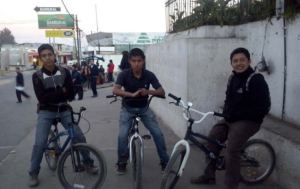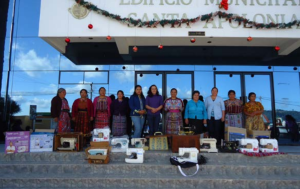By Patricia Hamill
Spring 2014 InGear
You’ve read about our partner in Guatemala, FIDESMA, the organization that promotes economic development through micro-credit, training in textile design and agricultural programs, among other efforts. They are doing so much to contribute to the needs of the people in their region and we are pleased to have some updates for you.
Three young men, poor students, were awarded a grant from FIDESMA for employment training in welding. The funds were raised through the sale of the bicycles sent from P4P. Without the bicycles that were transformed into needed funds, these young men could not possibly have begun, much less finished, the four months of required training. They completed their course in November of 2013.
These young men also needed to be able to put these skills to use. This of course meant that they needed employment opportunities and a way to access the locations where they would work. A blacksmith shop was made available to them and there they created metal ornaments, bikes and candlesticks to generate the income that would continue to reinforce their financial independence. In December, these men were able to acquire bicycles that had arrived in the 14th container shipped from P4P and received by ECOLOBICI. They can now travel readily between home and work. Ease of travel was one of the obstacles the young men had to overcome since, as you’ve read so many times about so many of the people in our partners’ regions, they would have to pay for public transportation, walk many miles or, in this case, take a motorcycle taxi.
Now 6.00 quetzals (about .75 in US currency) a day are saved by using a bike and they have the added advantage of keeping in shape. They have benefited from ECOLOBICI’s project supported by P4P and they plan on continuing their studies and efforts at financial success in 2014.
In the container mentioned above, there were also 15 sewing machines, some earmarked for particular women who had visited the FIDESMA training center. These women, from Santa Apolonia in the District of Chimaltenango, work sewing typical huipil blouses mostly. These are traditional garments that are loose fitting like a tunic. Since these kinds of shirts are in demand, they stand to make a reliable income continuing to sew these and other viable pieces of clothing. There are more men and women who will be able to access these machines and learn how to use them or continue to work at their tailoring businesses.
